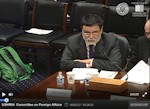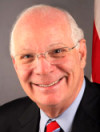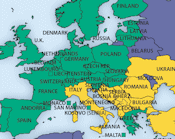 4/6/2014 - AHF issues statement regarding the 2014 Hungarian Elections: "The Hungarian government invited international observers for the April 6 parliamentary elections that included an observer from the U.S. Helsinki Commission. As the Socialist Party had been behind in the polls, its leader not surprisingly was cool to the idea of impartial international observers as he feared they would legitimize the outcome of the election. Instead, the political opposition with the assistance of its foreign friends launched a smear campaign to delegitimize and politically bludgeon the government, asserting that it was anti-democratic and an incorrigible violator of human rights." The statement appears in full below and is available for [download] 4/6/2014 - AHF issues statement regarding the 2014 Hungarian Elections: "The Hungarian government invited international observers for the April 6 parliamentary elections that included an observer from the U.S. Helsinki Commission. As the Socialist Party had been behind in the polls, its leader not surprisingly was cool to the idea of impartial international observers as he feared they would legitimize the outcome of the election. Instead, the political opposition with the assistance of its foreign friends launched a smear campaign to delegitimize and politically bludgeon the government, asserting that it was anti-democratic and an incorrigible violator of human rights." The statement appears in full below and is available for [download]
![[Download] the AHF Statement: "Proceeding with Democracy in Hungary in a Responsible Way."](docs/AHF_HungaryCriticism.gif) |
[ Download] the AHF Statement: "Proceeding with Democracy in Hungary in a Responsible Way." |
AHF Statement, April 6, 2014:
Proceeding with Democracy in Hungary in a Responsible Way
The Hungarian government invited international observers for the April 6 parliamentary elections that included an observer from the U.S. Helsinki Commission. As the Socialist Party had been behind in the polls, its leader not surprisingly was cool to the idea of impartial international observers as he feared they would legitimize the outcome of the election. Instead, the political opposition with the assistance of its foreign friends launched a smear campaign to delegitimize and politically bludgeon the government, asserting that it was anti-democratic and an incorrigible violator of human rights. The criticism extended to topics that are generally in the purview of national legislatures and hotly debated in other countries, including the United States, e.g., marriage, and matters generally left to internal discourse, e.g., historical events and figures. The barrage of relentless attacks had an unintended consequence – the strengthening of Jobbik.
Was the Socialist Party leader too hasty? Will the findings of the election observers be impartial? Or will they take a page from the political opposition parties in Hungary and their overseas friends. Realizing that they will lose at the polls, their incessant message was that the elections “will be free but not fair?” This would explain their expected loss while at the same time keep up the drumbeat against the government.
There are reasons to be skeptical. The criticism in the media noted above has been unusually and in several instances unjustifiably harsh as it relates to the state of democracy in Hungary. Such unwarranted criticism has even crept into certain official pronouncements. The American Hungarian Federation, among others, has expressed its deep concern about the lack of even-handedness when it comes to such tilted judgments. In its statement submitted to the Helsinki Commission on March 19, 2013, the Federation expressed its concern as follows:
Putting the internal affairs of democracies established on the western parliamentary model, such as Hungary, under a microscope, however, is unusual and requires rigorous analysis. If the microscope is brought to bear to evaluate the actions of the government, the two questions that always must be asked are as follows: do those actions transgress in any substantial manner the established institutional norms practiced by a consensus of democracies around the world? And do they transgress the democratic norms established within the country being discussed itself?
In engaging in this review, one must distinguish between political questions that may arise about a government's effectiveness or the wisdom of its policies and actions that may have breached in
any substantial way institutional norms of democracy as practiced around the world in its various forms.
Examining Hungary from this perspective, the legislative agenda of the current government, while perhaps politically controversial, does not rise to the grave level of putting "Democracy at Risk.” There has been robust, critical discussion in Hungary's media about every aspect of the key laws in question that Parliament has passed, no state repression of the opposition's right to publicly criticize and object, and no state efforts to deny the opposition its democratic right to peacefully win over the public to its side in the next elections.
In addition, demonstrators have freely expressed their anti-government opinions, while foreign commentators have given interviews, and critical assessments have been published in the Hungarian media. On winning the election, the opposition can and undoubtedly will introduce its own legislative agenda, and if it has enough support in the electorate as Fidesz did, it can enact its own changes to the constitution as well. These are core elements of democracy well in play in Hungary today.
The Federation strongly supports and encourages a robust review of these matters. . . . The Federation, however, is concerned with the insinuations that the process itself was somehow not democratic. One can agree or disagree with the outcomes, but to question the institutional integrity of the process ironically strips the credibility of the very democratic procedures at play that could be used to establish other outcomes by other elected governments as well.
Much of the criticism of the current electoral process has emerged from quarters that are prejudiced against the Hungarian government to begin with and should be seen as far from impartial. Yet it is precisely impartiality that is needed to honestly assess the current electoral process and the freedom and democracy associated with it.
A telling example of this prejudice was recently and unequivocally underscored when a blogger, a history professor who supports the Hungarian opposition, boasted about denigrating Viktor Szigetvari for publicly commenting on Kim Lane Scheppele’s analysis criticizing Hungary’s electoral system. Szigetvari was the Socialist Party’s campaign manager and is now co-chairman of Gordon Bajnai’s political party. Scheppele of Princeton University is thought of as an independent expert on Hungary. Relevant translated parts of the exchange on Twitter are enlightening:
Blogger: ”You shouldn’t put that opinion out there for everyone to see. Tell her.”
Blogger: “. . . .You all deserve to fail.”
Szigetvari: “No, I did not study law. But when it comes to electoral law, for example, Kim accepts my expertise. The last time we had a lengthy dinner together was a month and a half ago.”
Szigetvari: “. . . .I’ve had many personal meetings with her, and our personal relationship is one of respect. We agree for the most part.”
Blogger: “I sent your post because I was so outraged. We are working ourselves to death here, and you all are ruining everything.”
Szigetvari: “She has used/is using my analysis on several points. . . .”
Szigetvari: “For the most part I agree with her statement and always have, I have been helping her understand the details of the system for two years.”
Several critics will participate in a conference the day after the elections about democracy in Hungary. Other review events are planned. Now that the elections are over, the looming question is whether the critics will be professional and above all impartial and end the “free but not fair” campaign?
Frank Koszorus, Jr.
National President [< Go to all AHF news]
|
Related Articles
 1/24/2012 - AHF reacts to what it sees as politically motivated, unfair, unmerited, biased criticism of Hungary. "While democratic institution building should be encouraged and debated, it should be done based on facts, and in a fair, unbiased and evenhanded manner [it must be] bereft of partisanship (or even the appearance of partisanship) and undertaken solely in furtherance of promoting Western values, not political expediency." HUNGARY UNDER THE MICROSCOPE: GENUINE CONCERN OR POLITICS? [read more] 1/24/2012 - AHF reacts to what it sees as politically motivated, unfair, unmerited, biased criticism of Hungary. "While democratic institution building should be encouraged and debated, it should be done based on facts, and in a fair, unbiased and evenhanded manner [it must be] bereft of partisanship (or even the appearance of partisanship) and undertaken solely in furtherance of promoting Western values, not political expediency." HUNGARY UNDER THE MICROSCOPE: GENUINE CONCERN OR POLITICS? [read more]
 3/19/2013 -- United States Helsinki Commission holds Hearing entitled, "The Trajectory of Democracy – Why Hungary Matters" to "examine Hungary’s constitutional changes with a particular view to the independence of the judiciary, present-day Hungary’s relationship to its Holocaust-era past, and the implications of Hungary’s sweeping legal changes for civil society, including an independent media and religious organizations."... AMERICAN HUNGARIAN FEDERATION ISSUES STATEMENT. [read more] 3/19/2013 -- United States Helsinki Commission holds Hearing entitled, "The Trajectory of Democracy – Why Hungary Matters" to "examine Hungary’s constitutional changes with a particular view to the independence of the judiciary, present-day Hungary’s relationship to its Holocaust-era past, and the implications of Hungary’s sweeping legal changes for civil society, including an independent media and religious organizations."... AMERICAN HUNGARIAN FEDERATION ISSUES STATEMENT. [read more]
 2/27/2013 - Watch the podcast of Subcommittee Hearing: Anti-Semitism: A Growing Threat to All Faiths. Tamás Fellegi, Ph.D., Managing Partner of
EuroAtlantic Solutions
(Former Minister of National Development Government of Hungary) represented Hungary on the distinguished panel. [See the timeline of remarks and read more] 2/27/2013 - Watch the podcast of Subcommittee Hearing: Anti-Semitism: A Growing Threat to All Faiths. Tamás Fellegi, Ph.D., Managing Partner of
EuroAtlantic Solutions
(Former Minister of National Development Government of Hungary) represented Hungary on the distinguished panel. [See the timeline of remarks and read more]
 1/11/2013 - AHF again responds to Senator Ben Cardin, Co-Chair of the US Helsinki Commission. In his December 20, 2012 statement, the Senator was unfairly critical of Hungary. "...we are concerned that (1) your assertions concerning Hungary omit relevant facts; and (2) your statement fails to raise the discrimination and intolerant policies toward ethnic Hungarians in some of the countries bordering Hungary. The statement therefore leaves the impression... of bias, which could result in cynicism toward the Helsinki Commission and its valuable and necessary work." 1/11/2013 - AHF again responds to Senator Ben Cardin, Co-Chair of the US Helsinki Commission. In his December 20, 2012 statement, the Senator was unfairly critical of Hungary. "...we are concerned that (1) your assertions concerning Hungary omit relevant facts; and (2) your statement fails to raise the discrimination and intolerant policies toward ethnic Hungarians in some of the countries bordering Hungary. The statement therefore leaves the impression... of bias, which could result in cynicism toward the Helsinki Commission and its valuable and necessary work."
[read more]
 Amerikai Magyar Szövetség: részrehajlás nélküli megítélést! - MTI [Szeged Ma] Amerikai Magyar Szövetség: részrehajlás nélküli megítélést! - MTI [Szeged Ma]
 American Hungarian Federation slams “unmerited criticism directed at Hungary” [more] American Hungarian Federation slams “unmerited criticism directed at Hungary” [more]
 Magyarország amerikai mikroszkóp alatt: valós aggodalmak vagy elfogult politikai támadás? Az Egyesült Államok legnagyobb magyar emigráns szervezete, az Amerikai Magyar Szövetség közleményt bocsátott ki a Magyarországot ért politikailag motivált, érdemtelen amerikai kritikákra reagálva. Az írás különösen aktuális, hiszen februárban tényfeltáró amerikai kongresszusi delegáció utazik hazánkba. [tovább] Magyarország amerikai mikroszkóp alatt: valós aggodalmak vagy elfogult politikai támadás? Az Egyesült Államok legnagyobb magyar emigráns szervezete, az Amerikai Magyar Szövetség közleményt bocsátott ki a Magyarországot ért politikailag motivált, érdemtelen amerikai kritikákra reagálva. Az írás különösen aktuális, hiszen februárban tényfeltáró amerikai kongresszusi delegáció utazik hazánkba. [tovább]
 3/5/2012 - AHF has Follow-Up Capitol Hill Meeting on Recent Congressional Trip to Hungary and Slovakia. Prior to the delegation’s trip the Federation submitted background information on Hungary and Slovakia to the CODEL. “At a time when there is considerable misinformation being disseminated about Hungary and so little known about the discrimination against the Hungarian minority in Slovakia, we believe such fact-finding missions are most useful, welcome and greatly appreciated,” said Mr. Koszorus. [read more] 3/5/2012 - AHF has Follow-Up Capitol Hill Meeting on Recent Congressional Trip to Hungary and Slovakia. Prior to the delegation’s trip the Federation submitted background information on Hungary and Slovakia to the CODEL. “At a time when there is considerable misinformation being disseminated about Hungary and so little known about the discrimination against the Hungarian minority in Slovakia, we believe such fact-finding missions are most useful, welcome and greatly appreciated,” said Mr. Koszorus. [read more]
 2/17/2012 - AHF briefs top professional staff advisor to Chairman of the House Subcommittee on Europe and Eurasia on the eve of congressional delegation (CODEL) trip to Hungary and Slovakia. The Federation submitted a letter to the Chairman and Ranking Member along with significant background materials on Hungary andSlovakia and called their attention to recent harsh and 2/17/2012 - AHF briefs top professional staff advisor to Chairman of the House Subcommittee on Europe and Eurasia on the eve of congressional delegation (CODEL) trip to Hungary and Slovakia. The Federation submitted a letter to the Chairman and Ranking Member along with significant background materials on Hungary andSlovakia and called their attention to recent harsh and often politically motivated and unfair criticism of Hungary and the anti-Hungarian attitudes, policies and practices in Slovakia [read more] and join the discussion on Politics.hu! often politically motivated and unfair criticism of Hungary and the anti-Hungarian attitudes, policies and practices in Slovakia [read more] and join the discussion on Politics.hu!
 1/11/2011 - AHF Issues its First Statement on Hungarian Media Law: "A Rush to Judgment: The Reaction to the Hungarian Media Law." It is our "unassailable and firm conviction that freedom of the press is a cornerstone of democracy and liberty." But the unprecedented rush to judgment and vitriolic media coverage of the Hungarian media law seems to have been based on a partial understanding of the law itself and, in some cases, appears to be motivated by bias or political considerations. [Read more] 1/11/2011 - AHF Issues its First Statement on Hungarian Media Law: "A Rush to Judgment: The Reaction to the Hungarian Media Law." It is our "unassailable and firm conviction that freedom of the press is a cornerstone of democracy and liberty." But the unprecedented rush to judgment and vitriolic media coverage of the Hungarian media law seems to have been based on a partial understanding of the law itself and, in some cases, appears to be motivated by bias or political considerations. [Read more]
 7/12/2011 -- AHF Reacts to Senator Benjamin L. Cardin (D-MD), Co-Chairman of the U.S. Helsinki Commission, who questioned democracy in Hungary and criticized expressions of concern for Hungarian minorities. AHF's letter expressed its steadfast conviction that judgments be "objective, fair, balanced and based on facts and not generalizations and speculation." It also urged the Helsinki Commission not to ignore the Hungarian minorities but to publicly and privately encourage Slovakia and Romania "to build tolerant societies by respecting the rights of their Hungarian and other minorities and the rule of law." [read more] 7/12/2011 -- AHF Reacts to Senator Benjamin L. Cardin (D-MD), Co-Chairman of the U.S. Helsinki Commission, who questioned democracy in Hungary and criticized expressions of concern for Hungarian minorities. AHF's letter expressed its steadfast conviction that judgments be "objective, fair, balanced and based on facts and not generalizations and speculation." It also urged the Helsinki Commission not to ignore the Hungarian minorities but to publicly and privately encourage Slovakia and Romania "to build tolerant societies by respecting the rights of their Hungarian and other minorities and the rule of law." [read more]
Levelet írt az egyik szenátornak az Amerikai Magyar Szövetség
Levélben fordult az Amerikai Magyar Szövetség (AHF) Benjamin Cardin demokrata párti amerikai szenátorhoz, aki a múlt héten a Kongresszusi Közlönyben Magyarországgal kapcsolatos nyilatkozatot tett közzé. [tovább magyarul]
 Miért támadja Magyarországot az amerikai szenátor? Miért támadja Magyarországot az amerikai szenátor?
A legnagyobb amerikai-magyar szervezet levélben fordult Benjamin Cardin, marylandi szenátorhoz, hogy aggodalmát fejezze ki a törvényhozó szokatlanul éles hangvételű, július 6-i "Veszélyben a demokrácia Magyarországon" című közleménye miatt. [tovább magyarul]
 American-Hungarian federation strike back at US senator over critical comments, by MTI American-Hungarian federation strike back at US senator over critical comments, by MTI
The American Hungarian Federation (AHF) voiced “concern and perplexity” in a letter to Democrat Senator Benjamin L Cardin over his recent remarks concerning Hungary. [read more]
Join online!

|



